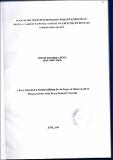| dc.description.abstract | The Church has been held in high esteem in the fight against evils that threaten destroy the social fabric and national unity. However, in Kenya the Church has not been spared when it comes to ethnic and tribal antagonism. The purpose of the study was to establish the role of the Church in promoting positive ethnicity among different ethnicity in churches in Nakuru Sub-County. The study was carried out in Nakuru Sub-county ¬with a focus on NCCK member churches. The target population in this study included the clergy and church leaders. Purposive sampling was used to select a sample of 81 respondents from 27 churches. The study was based on descriptive survey. Data was collected using questionnaires and analyzed both qualitatively and quantitatively with the aid of the Statistical Package for social sciences (SPSS). The analyzed data was presented in the form of figures, frequency tables and percentages. The study concludes that the main peace-building and reconciliation activities used by the church promoted positive ethnicity in Nakuru Sub-County. The clergy had received some formal education and were thus in a position to understand and appreciate their roles as the clergy and to promote positive ethnicity among the ethnic communities in Nakuru sub-County. However, the Church's involvement in the country's politics undermined the role of the Church in promoting positive ethnicity in Nakuru Sub¬ The study recommends that the Church be actively involved in activities that promote positive ethnicity in Nakuru Sub-County. It is also recommended that the Church should desist from direct involvement in the country's politics as this undermines the role of the Church in promoting positive ethnicity in Nakuru sub-county. The findings of the study expected to provide the church leaders with information on the strategies that can enhance ethnic cohesion and harmony in Kenya. | en_US |

